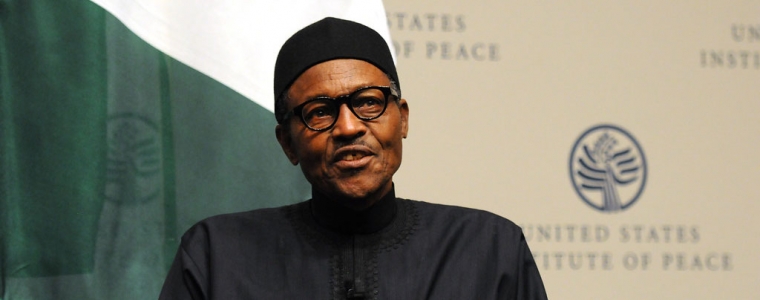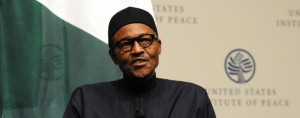


- A review by Uzo Nwokwu, Washington DC
Dateline July 22, 2015. Location: Down town Washington DC, USA, less than half a mile from the White House. The invitation from the United States Institute of Peace was as promising as it was inviting. “Nigeria: A Conversation with President Muhammadu Buhari”, co-hosted at the U.S. Institute of Peace with Atlantic Council, the Center for Strategic and International Studies, the National Democratic Institute, the International Republican Institute and the International Foundation for Electoral Systems”.
Virtually every invitee, Nigerians and non-Nigerians alike was ecstatic. A Conversation with the president of Africa’s most populous nation and the world’s sixth largest democracy? Buhari, an accomplished dictator to have a dialogue with Nigerians? The predominant body language was, “Let me go and see”. Friends and foes alike trooped down in droves to the 2301 Constitution Avenue NW Washington DC office of the USIP. Every head riveted with questions. Even those who could not make it had their questions ready for proxies. Ask him about Gay marriage. Will Buhari accept what Jonathan rejected?. Ask him about his lopsided appointments so far…Ask him about corruption …Ask him about his cabinet …Ask him about Tinubu…Will he probe him? Will he probe Jonathan’s administration…If so, will he spare IBB, Obasanjo, Abdulsalam Abubakar? Of course, there was Boko Haram too.
As early as 8.am on Wednesday, July 22, 2015, the facility was already over-flowing with human traffic for the 10.00 am event. No one was to gain access into the facility without prior registration online. That is standard. Yet, prior registration alone was not enough to guarantee access. As many found out to their chagrin, the name tags came in two categories-one with a blue dot and another that was plain. If your name tag had a blue dot, then you were considered an early bird, meaning you were one of the first set of folks to have registered online for the August event. In other words, admission was strictly by first-registered, rather than first-come, first served. The infamous “African time’ was not acceptable. Those who kept “African time” found themselves locked out of the event. The USIP management was prepared.
To the utter disappointment of many who had arrived early hoping to grab the front row, they were pointed to the adjoining hall, equipped with four television sets to beam the event live. Many had arrived quite early in the hope of grabbing the front row to as it were, “fire” their questions. However, It turned out to be like the proverbial heaven’s gate’. Name tag with the blue dot, you go right, into the main Hall. Plain tag, you went leftwards, to the adjoining hall, with an estimated capacity of about 150.
At exactly 10.14 am, President Buhari and his entourage walked into the venue and the next minute, the event proper started. Former US Assistant Secretary for Africa, Ambassador John Carson who piloted the session was introduced. He echoed the prevalent sentiments of Americans, citing President Buhari’s travails and triumph through the highway of democracy, culminating in his March 28, 2015 victory at the polls. Ambassador Carson recalled in particular that President Buhari contested and lost three times-2003, 3007, 2011 and 2015 before emerging victorious.
Three, four questions down the lane, many facts came to the fore. First, this is 2015, not 1960. Second, this is President Muhammadu Buhari, not Alhaji Abubakar Tafawa Balewa. Third, this was as one observer put it, “not a state visit but more or less a summons”, whatever that means. It became clear, particularly to the well-prepared Nigerian-Americans present that it was not going to be a day of long knives because the host was not prepared to roast his guest. There was a perceptible but unspoken cordon around Mr. President, which ensured that only a certain genre of questions got to him. No one was going to embarrass him, period.
When the President took the floor to answer questions, he was cool and slow, and made no pretentions at all about his deliberate, careful steps. The expectations back home was becoming rather choking. His priorities remain Security, Infrastructure, transparency and zero-tolerance for corruption. Nigeria, he said, needed their support to succeed against Boko Haram. The resources of the country had been so badly mismanaged, and people were going to be held accountable. He was not going to change his style, but would remain “slow and steady”, with his eyes trained on the big target-success. He was aware Nigerians were becoming impatient with him. He joked that Nigerians had since changed his name from “Sai Buhari” to Baba Go Slow”. Nor did he make any pretentions about his style of delivery. When his interviewer attempted to lump several questions together so the president could take them together, he told Ambassador Carson that he did not trust his brain to remember more than one question at a time, opting instead to field them one at a time.
Asked about his first outing as a military ruler, the infamous decree no. 4 and human rights violations of that era, President Buhari vigorously defended that government and re-affirmed his status as a born-again democrat. His evidence-in-chief was that certain reports by the media embarrassed the government, whether they were true or not.
Even if he did not say it, President Buhari came across as a Chess master, who had his every move stocked in his chest. Not even his cool demeanor could veil his commitment.
Yet the excitement in the air was electric. To President Buhari’s credit, he appeared to enjoy tremendous goodwill, not only of the US establishment, but also of a vast majority of the population. Even as many struggled to understand him, they seemed united in their hope that a new era was here for Nigeria, and that at last, a Daniel was come to judgement. It is either Americans had fallen in love with President Buhari or Nigeria, or even both.
Of particular interest is the constitution of the audience. Quite a lot of Americans were in attendance, in a manner probably not seen in a long while. They were equally as excited, if not more excited than many Nigerian-Americans present. But as one US businessman with a lot of both “for-profit” and not-for-profit” interests in Nigeria told this writer, only time shall tell whether President shall live up to his expectations or not.
In the end, nearly all Nigerian-Americans in attendance had to return home with their questions for their president virtually unanswered. What with eighty percent of the questions coming from the American audience, and just about one from a Nigerian-American. Many present could not but wonder if the event should not have been more appropriately called, “America: A Conversation with President Muhammadu Buhari”.
For more visit: http://www.usip.org/events/nigeria-conversation-president-muhammadu-buhari
http://www.usip.org/publications/2015/07/22/nigerias-buhari-presses-military-aid-pledges-zero-tolerance-corruption







